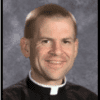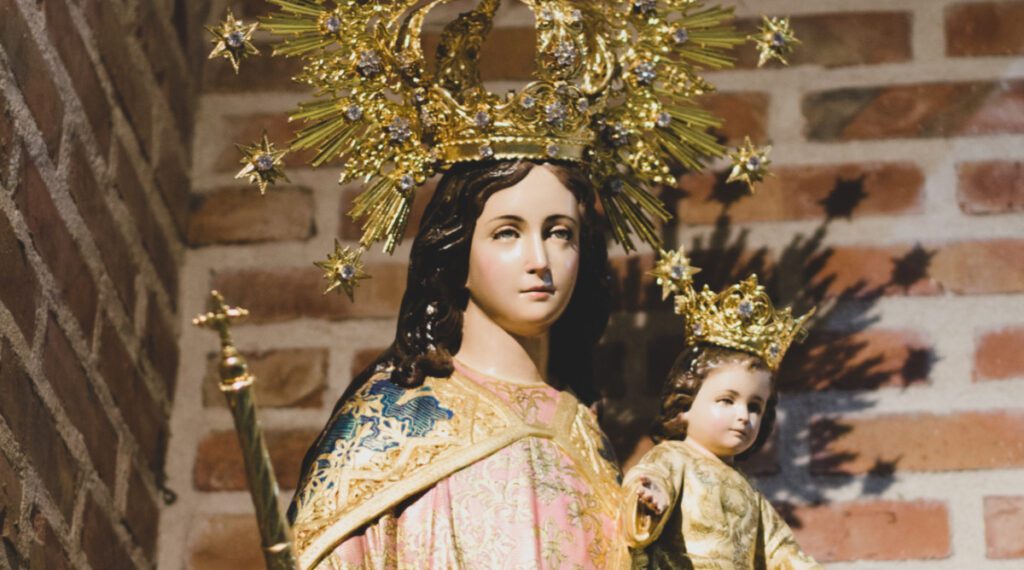O marvelous exchange! Man’s Creator has become man, born of the Virgin. We have been made sharers in the divinity of Christ who humbled himself to share in our humanity.
We pray these words each year on the eve of January 1 in the Liturgy of the Hours. In the wake of so many gift exchanges, we reflect on the one exchange that truly matters. The Son of God, who is eternally divine, willingly empties himself of his divine privileges (Phil 2:6-11). He assumes human nature, born of the Virgin Mary in the flesh.
The result is a one-flesh union that weds humanity and divinity together in the person of Jesus. He is the eternal Son of God, who is himself God (John 1:18). He has truly taken up human flesh. He dwelt among us; he abides with us still.
The theological term for this mystery is “the Hypostatic Union” – which means that Jesus is truly human and truly divine, with both natures united in the one person, who is the eternal Word of God. Mary gives birth to that one eternal person, which is why the early Church (at the Council of Ephesus in 431) insisted that it is right to call her theotokos – “God-bearer” – or as we typically say in English, “Mother of God.” She gave birth to a person, not a nature.
More importantly, humanity and divinity are truly wedded together. This is the first taste of the eternal marriage feast between Jesus and his bride, the Church. A week ago, on Christmas Eve, the Liturgy of the Hours pondered the same mystery:
When the sun rises in the morning sky, you will see the King of kings coming forth from the Father like a radiant bridegroom from the bridal chamber.
The Father sends his own Son among us like a bridegroom, traveling to wed his bride and bring her into his Kingdom. This process begins with the Incarnation – the Word becoming flesh. In his person, humanity and divinity enter a one-flesh union that makes it possible for us to receive grace upon grace from divine fullness. The process continues with him freely and totally giving himself on the Cross, truly dying, and truly rising. Then, in the Ascension, he exalts human flesh in the presence of his Father. All is prepared for the feast – and we are invited to share in it!
We now live in this in-between time of “already but not yet.” Humanity has already been wedded to divinity in the person of Jesus. Human flesh is already exalted at the right hand of the Father. All of humanity is invited to share in this marriage covenant. The only question is what we desire and whether we will give our consent.
Recall the story of the merciful father in Luke 15 (known more popularly as the story of the “prodigal son”). The larger context of the story is the eternal feast, to which we are all invited. The older son is still preferring his own not-so-marvelous means of exchanging: If I do this, then you have to do that. He would rather be an employee than a son. He is enraged with envy as he watches his younger brother freely receive far more than he ever dared to dream or desire.
His father speaks tenderly to him, “My son, you are here with me always – all that I have is yours!” (Luke 15:31).
Here we encounter the profound truth of the “marvelous exchange” that Jesus brings. All that is his is ours. That means that we, too, are beloved children of God. It means that we, too, get to share fully in the eternal marriage feast – not because we have been diligent in our duty, but because God delights in us as his children and desires to celebrate with us forever.
A wise priest recently heard my Confession and reminded me of my own favorite story of Luke 15. I spend so much of my time laboring – chasing the illusion of getting “caught up.” I allow myself to succumb to the unrealistic expectations of others – and to my own even more demanding expectations. That puts me in the role of the elder son, toiling away in isolation, and envying those who seem to have enough time to feast. Eventually that joyless labor exhausts me, and then I shift roles to the younger son, seizing joyless pleasure for myself with entitled anger. When I get stuck in that elder son / younger son cycle, my life truly becomes miserable.
And the Father’s gentle invitation is still always there: My son… All that is mine is yours…
As the Catechism of the Catholic Church reminds us, “To become a child in relation to God is the condition for entering the kingdom” (n. 526). Will I claim that identity as a beloved child of God? Will I surrender all of myself to him so that I can receive from his fullness?
It is a special invitation to a marvelous exchange. I am invited to give God my humanity: ALL of myself, just as I am. My tendency is to focus on the more presentable pieces of myself – which are not nearly as amazing as I like to think they are. Those are usually my “elder son” pieces, but God desires my “younger son” pieces as well. And he desires the pieces of me that are buried yet more deeply – some of which are still a mystery even to me. But he knows them all, because he sees me in my wholeness. He desires ALL the pieces – so that he can divinize all of them as he restores me and exchanges my shame for his Glory.
In the 300’s, Gregory of Nazianzus declared, “What has not been assumed has not been healed; it is what is united to his divinity that is saved.” The Father invites me to give all the shattered pieces to him so that he can pour divine fullness into all of me. It is an invitation to vulnerable receptivity in an intimacy that exceeds that of the one-flesh union of earthly marriage – which is the best sign and symbol for what is to happen. But earthly marriage will fade away in the Kingdom (Matthew 22:30), giving way to the eternal wedding feast of the Lamb. Even now we are invited to surrender ourselves with the vulnerable receptivity and humble dependence of little children.
When we do so, we receive the power to become sons and daughters of God. We receive grace upon grace from his divine fullness. We begin sharing in the feast.




